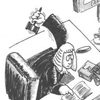Last October, across the ocean, a Lord of the British Realm declared that journalists could print untrue things as long as they practised “responsible journalism.” With time, these weighty words could yet make the voyage to Canada.
“My Lords,” Lord Bingham began his opinion for the House of Lords, Britain’s highest court: “This appeal raises two questions on the law of libel.” Those two questions were, first, the right of a corporation to sue without proving damages, and second, something more significant for journalists: “the scope and application of what has come to be called Reynolds privilege, an important form of qualified privilege.
The case was Jameel v. Wall Street Journal Europe. Shortly after 9/11 the newspaper ran a story alleging that the Saudi national bank was monitoring certain bank accounts for terrorist connections in cooperation with the U.S. The president of one of the companies named sued for defamation. The Journal couldn’t prove the truth of its claims because it couldn’t name its sources.
An ordinary libel case might have ended right there. But seven years ago, British courts opened a loophole – “Reynolds privilege.” It’s been of little real use to journalists since, and Canadian courts have so far averted their eyes from it. But the Lords blew Reynolds wide open with their ruling in Jameel and let loose a legal tsunami that could yet splash the ermine robes of the Supreme Court of Canada – and cast a damper on libel plaintiffs who have had it so good on these provincial shores.
And that’s a big if. But if the world does change, grateful Canuck scribes may want to raise a pint of Guinness to an Irishman named Albert Reynolds for suing Britain’s most venerable paper.
• • •
The year was 1994. Albert Reynolds, prime minister of the Republic of Ireland, had stepped down amidst parliamentary scandal. The following weekend, The Sunday Times ran a front page story: “Goodbye gombeen man – Why a fib too far proved fatal for the political career of Ireland’s peacemaker and Mr Fixit” The Times’s story repeated claims that Reynolds had intentionally misled Parliament; Reynolds sued for defamation.
Libel law is a balance between protection of personal reputation and freedom of expression. Historically, in Britain and the rest of the commonwealth, the law has tilted dramatically toward privacy. Until Reynolds v. Times Newspapers all plaintiffs had to prove was that what was printed lowered their reputation in the eyes of the right-thinking public. After that the burden of proof shifted to the writer or publisher, who usually had only one option: prove the printed statements were accurate.
Instead, the Times argued that the defamatory statements were protected under a legal principle called “qualified privilege.” This protection applies when people say possibly untrue things in particular situations. For example, Canadian and British journalists can print defamatory accusations if they’re made in court. In the US, privilege extends to all comments on public officials provided that they are printed without reckless disregard or malice.
The jury rejected the Times’s argument but refused to award damages to Reynolds because, in its view, the article wasn’t malicious. The judge later upped the damages to one penny. Both sides appealed.
After three years of trials, retrials and appeals, the House of Lords came down with a decision that widened the qualifications for qualified privilege dramatically: the press would be protected if tenets of “responsible journalism” were followed. Lord Nicholls, writing for the court, illustrated this idea with ten commentsdesigned to help future courts determine whether or not journalists had acted responsibly in a particular set of circumstances. Among these: the credibility of the information, the tone of the article, and the urgency of the issue. The Times lost its case on the eighth point, which requires that the article should contain “the gist of the plaintiff’s side of the story.”
As Toronto lawyer Peter A. Downard says, the Reynolds ruling “essentially involves the court adopting, on an ongoing basis, almost a code of conduct for journalists. The theory being that if journalists are to be given some degree of immunity in damaging people’s reputations, then they are going to have to prove that that immunity is well-earned by responsible conduct in particular ways.”
Although Reynolds went for the plaintiff and against the press, many lawyers saw hope for a more positive climate for investigative journalism. At first, says Amanda Ball, an expert on British media law at Nottingham University, “people were describing it…as a paradigm case. It could potentially massively shift the balance towards the defence” But in the next seven years, only two defendants succeeded in persuading a court that their journalistic practices had met the Reynolds standards. Judges were following Nicholls’s list so specifically that his points became hurdles, not aids, to libel defendants. Whatever responsible journalism was, almost no one, it seemed, could meet its standards.
Then came Jameel.
• • •
Since both the American and Saudi governments refused to comment officially, TheWall Street Journal’s 2002 story relied on anonymous sources. Given the secretive nature of the Saudi government, proving that it covertly monitored bank accounts would be impossible; the only feasible way to argue this case was on the grounds of qualified privilege. The court of appeal rejected the paper’s Reynolds argument on the narrow grounds that the journalists had failed to get Mohammed Jameel’s comment on their story. The Journal had tried contacting him the night before publication but he was unavailable at the time. The newspaper declined to delay publication. But, as the Lords would later find, Jameel was in no position to know the government was monitoring his accounts; waiting would not impact the story.
Last October, the Law Lords dropped their bombshell. Lord Bingham not only saw fault in the way the lower courts had ruled on Jameel, but criticized the whole history of interpretation of Reynolds. The courts had lost sight of the Reynolds forest, focusing instead on the trees – the list of ten standards. As the Lords saw it, two questions underlie Reynolds: was the article on a matter of public interest? And was “responsible journalism” practised? In the Lords’ view, the Journal’s story had met these standards.
The Law Lords allowed that a clear definition of “responsible journalism” would need to evolve in coming years of litigation. They did, however, emphasize several points: journalists should take reasonable steps to verify what they print, should honestly believe that what’s printed is true, and, where reasonable, should contact people named to give them a chance to respond. “It’s the English courts doing what the Americans did in the early ‘60s really,” says lawyer Bert Bruser, who frequently advises The Toronto Star. If it plays out the way the Law Lords intend, the ruling will give journalists greater confidence to pursue serious journalism, which was Nicholls’s original purpose.
As unsuccessful plaintiff Mohammed Jameel himself commented to the Associated Press: “[T]he Court of Appeal ruled that I was libelled. The House of Lords ruled that I was not because it was reasonable for The Wall Street Journal Europe to print something that was false. So be it. I was only ever interested in proving that the allegations were untrue.”
• • •
Here in Canada, another libel action started with a story published in the days after 9/11 and ended last October. But it went rather differently.
On September 25, 2001, TheOttawaCitizen printed an article under the headline, “‘Renegade’ OPP officer under fire — Const. Danno Cusson, who left his post for New York, told to leave Ground Zero.”
Cusson had been hailed as a hero for defying orders and eventually quitting his job to help with the 9/11 rescue effort. The story left a positive impression of Cusson, but included a New York State Police officer’s allegations that Cusson hindered the rescue efforts and falsely identified himself as an RCMP officer trained in K-9 rescues.
Cusson sued the Citizen for libel, and the story’s author, Douglas Quan, was grilled on the stand about his reporting. According to the Citizen’s subsequent trial report, Cusson’s lawyer, Ronald Caza, took issue with Quan having failed to report certain things that the ex-cop had told him:
“I want you to show me where you wrote in this article that he gave his police badge to everyone,” the lawyer told Quan, reviewing a copy of a transcript of his interview with Cusson.
“I did not reflect that in the story,” Quan replied. “I did put in the story that he was adamant in his denial” of having represented himself as an RCMP officer.
“Is there anywhere in the story that Danno Cusson … said he showed his badge to everyone?”
“There is no reference to a badge, correct,” replied Quan.
And so it went on. In the end, a jury found that the New York State police officer’s comments were libellous, and that the Citizen was at fault for printing them; Quan’s attempts to balance the story weren’t good enough, in the eyes of the court. Rejecting the newspaper’s Reynolds-like defence of qualified privilege, the court ordered the Citizen to pay $100,000 in damages. That award came just two months before the ruling inJameel. A pity, according to Toronto media lawyer Brian Rogers, who says the Lords’ opinions could have helped the newspaper’s defence.
The Canadian and British legal systems ran in a single vein until 1949, when Canada achieved judicial independence. Even since then, the British tradition of common law continues to hold sway in Canada, excluding Quebec, and our courts look to Britain for guidance when there is no domestic precedent. As a result, up until Reynolds, Canadian and British libel laws were virtually identical. Reynolds has since been argued, considered, and rejected by Canadian courts — but only on basis of the particular cases. “As a defence, notionally, [the `responsible journalism’ privilege] is there in our common law as far as I’m concerned,” Rogers says. It’s just that there hasn’t yet been a trial that’s forced the issue.
What will happen when that crucial trial comes along is far from certain. Will tomorrow’s Canadian journalists feel as constrained as today’s to print only those possibly defamatory statements that they’re ready to prove as true in a court of law? Or will they rest a little more easily on the knowledge that they have done their jobs with all due care? And who will decide what the standards of care are?
Lord Hope, writing in support of his colleague Bingham, described “responsible journalism” as “a standard which everyone in the media and elsewhere can recognize.” But does “elsewhere” include this True North? As hundreds of stories – on both sides of the Atlantic — have ended: Only time will tell.
Click here to read Peter A. Downard’s analysis of the Jameel ruling.
About the author
Joe Rayment was the Senior Editor for the Summer 2007 issue of the Ryerson Review of Journalism.

